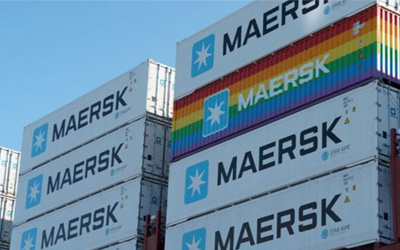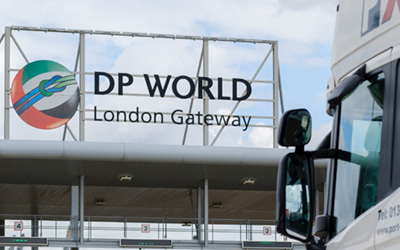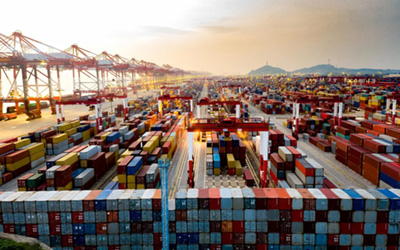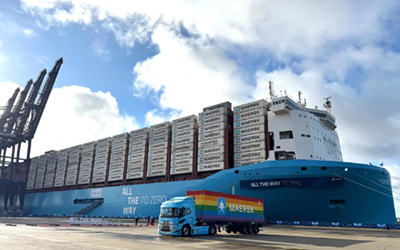Maersk's Historic UK Port Transition: London Gateway Set to Reshape British Shipping Landscape
In a transformative development for British maritime logistics, shipping giant Maersk has announced plans to shift its major container operations from the historic Port of Felixstowe to London Gateway starting February 2025. This strategic realignment, part of Maersk’s new Gemini Cooperation with Hapag-Lloyd, promises to reshape the competitive dynamics of UK port operations.
The Evolution of UK Container Ports
 The decision marks a significant milestone in the evolution of Britain’s maritime infrastructure. While Felixstowe has served as a cornerstone of UK shipping since 1886, with current annual handling capacity exceeding 4 million TEU (Twenty-foot Equivalent Units), London Gateway has rapidly emerged as a modern challenger since its 2013 inauguration. The younger port currently processes approximately 2 million TEUs yearly, showcasing remarkable growth in just over a decade.
The decision marks a significant milestone in the evolution of Britain’s maritime infrastructure. While Felixstowe has served as a cornerstone of UK shipping since 1886, with current annual handling capacity exceeding 4 million TEU (Twenty-foot Equivalent Units), London Gateway has rapidly emerged as a modern challenger since its 2013 inauguration. The younger port currently processes approximately 2 million TEUs yearly, showcasing remarkable growth in just over a decade.
Strategic Implications of the Transition
Maersk’s port migration stems from its ambitious partnership with Hapag-Lloyd under the “Network of the Future” initiative. This collaboration targets an unprecedented 90 percent schedule reliability rate, prioritising operational efficiency through streamlined port calls and simplified network structures. The transition will primarily impact Asia-Europe trade routes, while trans-Atlantic services will continue through Southampton.
London Gateway's Infrastructure Investment
 DP World, London Gateway’s operator, has positioned the facility for this expansion through substantial infrastructure development. Their £1 billion investment program includes:
DP World, London Gateway’s operator, has positioned the facility for this expansion through substantial infrastructure development. Their £1 billion investment program includes:
- Construction of two additional berths
- Development of a second rail terminal
- Installation of advanced cargo handling equipment
- Recent completion of a £350 million fourth berth
This investment strategy aims to establish London Gateway as the UK’s premier port facility, targeting 55 percent of south-eastern Britain’s cargo flow. The port’s location, just 28 miles from central London along the River Thames, offers strategic advantages for domestic distribution.
Impact on UK Maritime Competition
The transition represents both challenges and opportunities within Britain’s port sector. Felixstowe, operated by Hutchison Ports, faces the prospect of losing approximately two weekly vessel calls from one of its major customers. This shift could trigger broader changes in UK maritime logistics patterns, potentially influencing other shipping lines’ port choices.
Future Outlook for British Ports
 This development signals a broader evolution in British maritime infrastructure, where modern facilities with advanced automation and excellent inland connections increasingly attract major shipping alliances. The competition between established ports and newer facilities continues to drive infrastructure investment and operational improvements across the sector.
This development signals a broader evolution in British maritime infrastructure, where modern facilities with advanced automation and excellent inland connections increasingly attract major shipping alliances. The competition between established ports and newer facilities continues to drive infrastructure investment and operational improvements across the sector.
For supply chain stakeholders, this transition underscores the importance of adaptability and strategic planning. Companies relying on container shipping services through British ports may need to reassess their logistics arrangements and consider the implications for their supply chain operations.
The maritime industry will closely monitor this transition’s execution and its effects on service reliability, cargo handling efficiency, and broader market dynamics. As global shipping continues to evolve, such strategic realignments may become increasingly common as carriers optimise their networks for enhanced performance and reliability.
 Local Impact and Community Response
Local Impact and Community Response
The announcement has sparked measured concern among local stakeholders and representatives. Parliamentary figures and business leaders emphasise the need for strategic planning rather than reactive measures. Suffolk Labour MP Jenny Riddell-Carpenter highlighted Felixstowe’s enduring significance in global maritime operations while acknowledging the challenging nature of Maersk’s decision.
“Felixstowe maintains its position as one of the UK’s premier ports with substantial national and international influence,” Riddell-Carpenter stated, pledging continued support for the port’s global competitiveness. “While this development presents challenges, our focus remains on reinforcing Felixstowe’s strategic importance in international shipping.”
Infrastructure Investment Priorities
The Suffolk Chamber of Commerce has responded by emphasising the critical importance of infrastructure enhancement. Their analysis suggests that strengthening transportation links could be key to maintaining Felixstowe’s competitive edge. “In today’s increasingly competitive port landscape, superior rail and road connectivity will be crucial for retaining existing business and attracting new opportunities,” the Chamber noted in their official statement.
This infrastructure-focused approach aligns with broader industry trends, where port competitiveness increasingly depends on:
- Efficient multimodal transportation links
- Modern handling capabilities
- Robust supply chain integration
- Strategic geographical advantages
This was headline news all reported by the BBC article and local news channels who also covered the story.
Conclusion
Looking Ahead: The Future of UK Ports
The transformation of Britain’s port landscape through Maersk’s strategic shift represents more than just a change in shipping routes. It signals a broader evolution in maritime logistics, where factors like infrastructure investment, technological advancement, and supply chain efficiency increasingly determine competitive success. While Felixstowe faces immediate challenges, its established position and potential for adaptation suggest resilience in the face of change. Meanwhile, London Gateway’s ascendance highlights how modern port facilities can rapidly reshape traditional maritime hierarchies.
As the 2025 transition approaches, the success of this bold move will likely influence future decisions across the global shipping industry. The outcome may well set new standards for port operations and carrier-terminal relationships in an era where reliability and efficiency are paramount.
FAQ's
 Q: When will Maersk’s transition from Felixstowe to London Gateway take effect?
Q: When will Maersk’s transition from Felixstowe to London Gateway take effect?
A: The transition is scheduled to begin in February 2025, coinciding with the launch of the Gemini Cooperation between Maersk and Hapag-Lloyd.
Q: Will this affect all Maersk services at Felixstowe?
A: The change primarily affects Asia-Europe trade routes. Trans-Atlantic services will continue to operate through Southampton.
Q: What is London Gateway’s current capacity compared to Felixstowe?
A: Felixstowe currently handles over 4 million TEU annually, while London Gateway processes approximately 2 million TEU. However, DP World’s £1 billion investment aims to significantly increase London Gateway’s capacity.
Q: Will this affect employment at either port?
A: While specific employment impacts haven’t been detailed, both ports are expected to maintain significant operations. London Gateway’s expansion suggests potential job growth, while Felixstowe’s established operations continue to require substantial workforce support.
SARR Logistics UK
With a legacy built on trust, SARR Logistics UK emerges as the ultimate partner who are transparent with their pricing structure so you have no shock moments when you are quoted. If you would like to know more reach out to us today to experience a seamless, efficient, & dependable shipping solution tailored to you. For further inquiries and to explore how SARR Logistics UK can help you contact our team today.



 Local Impact and Community Response
Local Impact and Community Response





